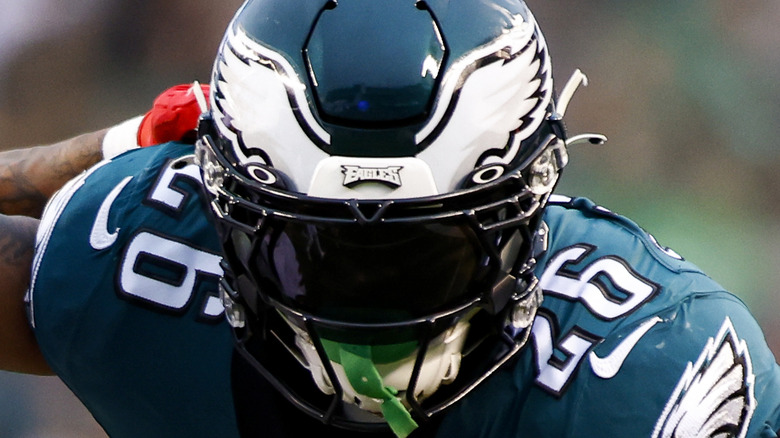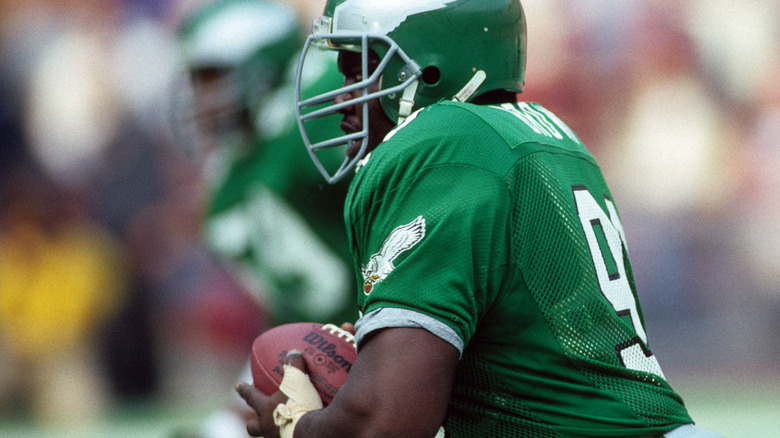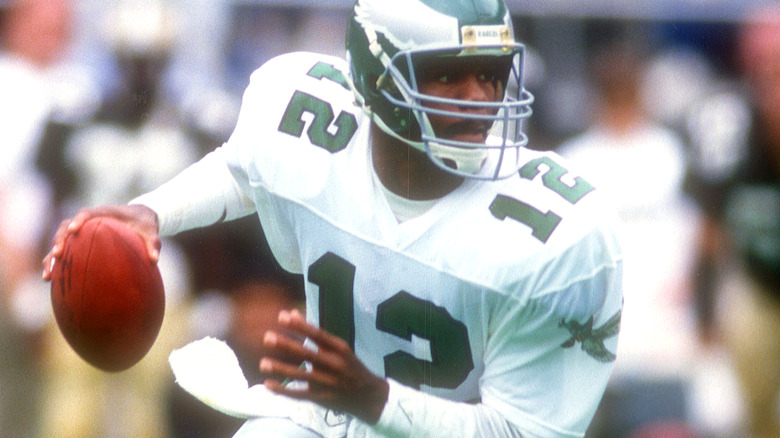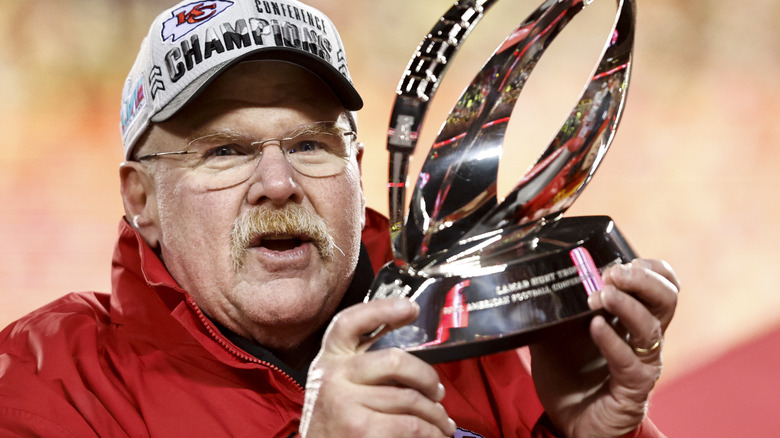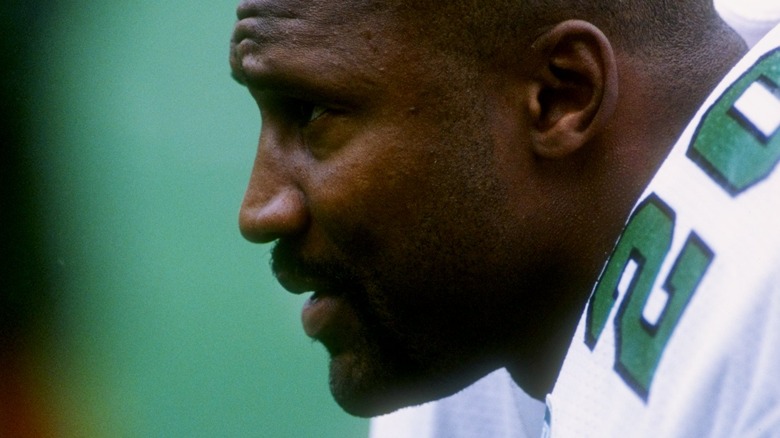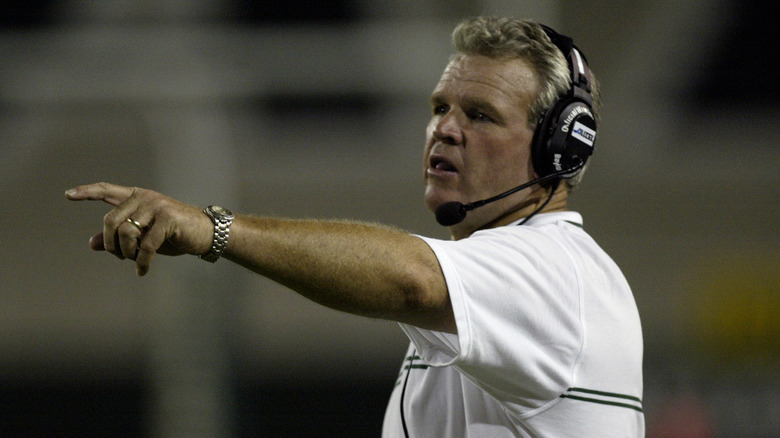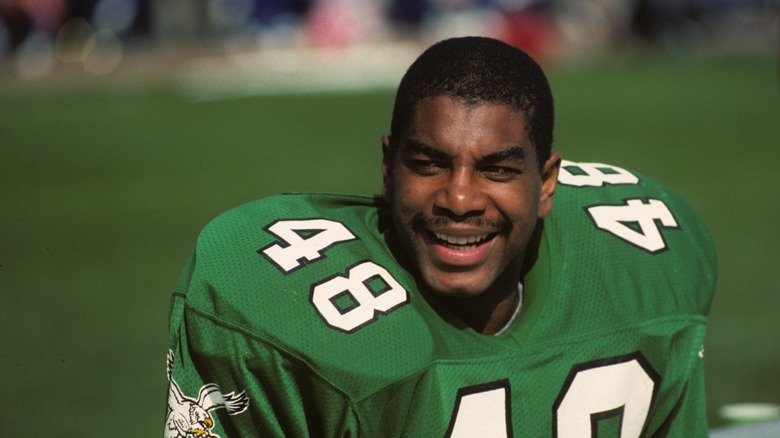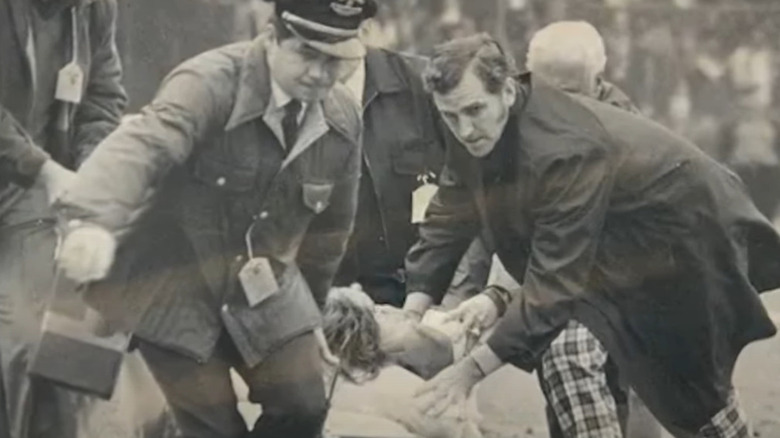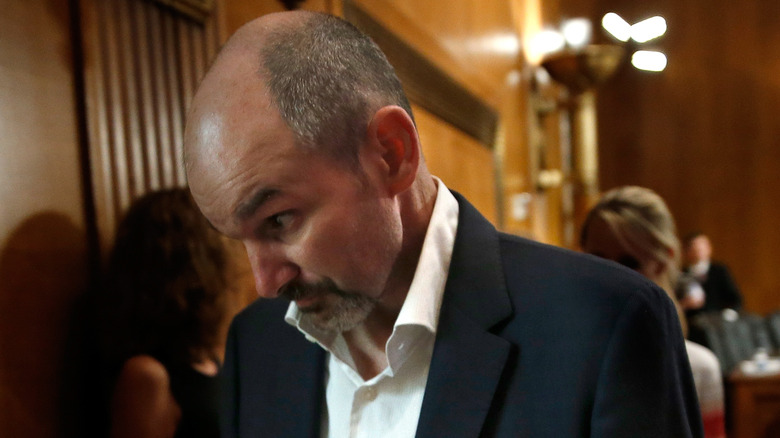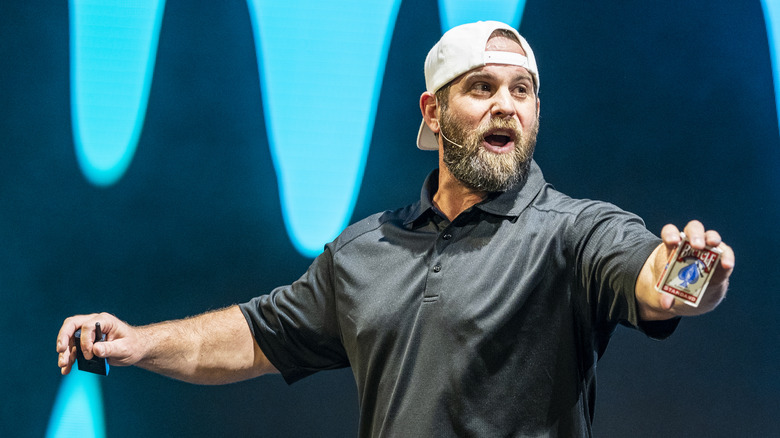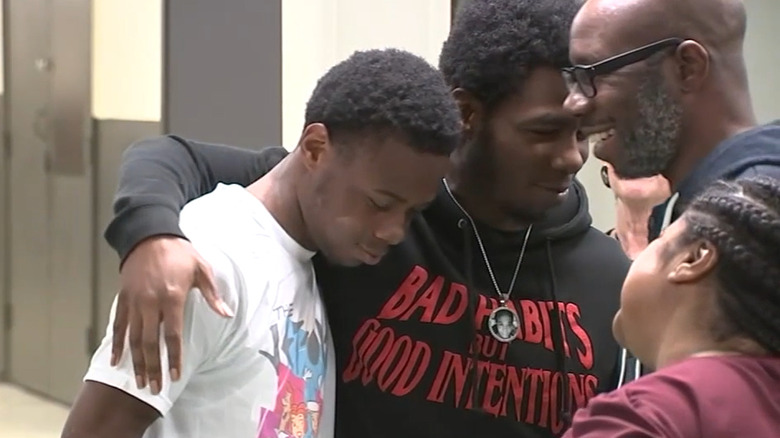The Tragic Real-Life History Of The Philadelphia Eagles
ESPN once claimed that, of all the teams in the NFL, the Philadelphia Eagles maintained some of the highest rates of game attendance. Even frigid temperatures and heavy snowfall during the 2013 Snow Bowl didn't deter fans from coming out. That level of commitment hasn't always translated into the best reputation for the Eagles or their fans. Even a laudatory article like ESPN ran didn't avoid bringing up Philadelphia's reputation for unruliness over sports. And part of the fame of the Eagles is the number of high-profile rivalries they've maintained over the years.
While some of those rivalries have yet to carry as far as the Super Bowl, the Eagles have played in the contest four times as of February 2023 (per NBC News).
But the Eagles, like every team in the NFL, have had their share of setbacks. Beyond poor seasons and bad press, players, coaches, and fans have had to endure personal tragedies over the years.
Jerome Brown died in a car crash
Jerome Brown was a native of Florida state, and he maintained connections to his hometown of Brooksville. But that didn't impede his fellow players on the Philadelphia Eagles from embracing him. The defensive tackle was well-regarded for his efforts on and off the field. In five years of professional football, he became an indispensable component of the team's defense (per NBC News). And he was commended for, among other acts of kindness, rescuing a trucker and helping other Brooksville residents stand up to the Ku Klux Klan. Per the Los Angeles Times, he was also considered an outgoing and good-humored teammate.
In June 1992, Brown had spent the prior year under the cloud of a minor scandal related to his drinking, but it hadn't dimmed his career. He and his nephew took a Corvette from a Brooksville Chevrolet dealer for a drive. When they came upon a slick patch of road, Brown lost control of the car. It flipped and crashed, killing both Brown and his nephew. Brown was only 27 at the time; his nephew was 12.
Though Brown's tenure with the Eagles was relatively brief, his impact was considerable, and his fellow players struggled for years to recover from the loss. "It took us a long time to understand how to come back and try to fill that friendship void," Eric Allen told The Daily News (via The Philadelphia Inquirer). "That was like a brother, not a teammate."
Randall Cunningham's son drowned in an accident
At one point in his career, Randall Cunningham was described by a Bleacher Report headline as "a one-man team." As quarterback for the Philadelphia Eagles, he never led the team to victory in the playoffs, and Eagles coach Buddy Ryan's focus on defense limited Randall's support and skill. But he won praise for his throwing and speed, showed himself unusually adept at running in touchdowns himself, and set an NFL record for rushing yards in 1990. He was dropped by the Eagles in 1995 but went on to a greatly improved performance with the Minnesota Vikings in 1998.
Randall bopped between the Cowboys and Baltimore Ravens in 2000-2001 but officially retired as an Eagle a year later, although he didn't actually play for the franchise that year (per UPI). In 2003, he took up a new calling: religion. After becoming an ordained minister, he established his own nondenominational church, Remnant Ministries in Las Vegas. The Twin Cities Pioneer Press reported that the chaplain for the Vikings in the 1990s played a large role in Randall's spiritual journey, and Randall himself was chaplain for the Las Vegas Raiders for two years (per NBC).
As a minister, Randall Cunningham sometimes used a hot tub at his home to perform baptisms. On June 29, 2010, while he was away, one of his children, Christian Cunningham, was found in the tub. He was given CPR and taken to the hospital, but it was too late. At only 2 years old, Christian had died of accidental drowning (per ABC News).
Andy Reid's son died from drug use
Football coaches routinely deal with certain stresses. Besides training and directing their teams and facing pressure to win, they have to contend with fan opinion, often loud and critical, about their coaching. Andy Reid, according to Bleacher Report, endured plenty of rebukes while coaching the Philadelphia Eagles. But his skill in working with quarterbacks had been established before he came to Pennsylvania, and he guided a succession of quarterbacks to impressive seasons as head coach of the Eagles.
Closer to home, Andy faced challenges with his son, Garrett Reid. Per EPSN, the younger Reid had a longstanding issue with heroin addiction. He was arrested in 2007 after causing a car crash while under the influence. He also sold drugs in poorer neighborhoods for a time. Garrett made efforts to curb his addiction and worked for the Eagles as an unofficial camp assistant. But in 2012, according to the NFL, Garrett died of an accidental overdose of heroin. His family issued a statement through the Eagles commending his efforts to end his drug use and offering support to families in comparable situations.
Andy's younger son Britt Reid has also struggled with drug use. He was arrested the same year as his brother and was later involved in a 2021 car crash that severely injured a young girl (per the Los Angeles Times). By that time, Andy Reid had left the Eagles after 14 seasons to become head coach of the Kansas City Chiefs.
Andre Waters suffered injuries and died by suicide
In 2006, 44-year old Andre Waters was found dead by his girlfriend in his home in Tampa, Florida (per ESPN). The death was ruled a suicide. Waters was a Florida native who had first come to Pennsylvania to attend Cheyney University. He signed with the Philadelphia Eagles in 1984 and played with them for nearly 10 years, earning a reputation for his aggressive and often fined tackles. He briefly played for the Arizona Cardinals after leaving the Eagles before becoming an assistant coach at Fort Valley State University.
Waters suffered numerous injuries during his time as a player. Before his death, his family reported increasing signs of depression. According to The New York Times, an examination of Waters' brain tissue showed damage comparable to an elderly man in the early stages of Alzheimer's. Neuropathologist Dr. Bennet Omalu speculated that the blows Waters' took while playing were either directly responsible for his brain damage or a significant contributor. While not an official or independently corroborated theory, the idea did fuel discussions over potential long-term health consequences faced by NFL players.
Omalu's investigation was the subject of a 2015 film, "Concussion," starring Will Smith as Omalu and Richard T. Jones as Waters. Per The Palm Beach Post, many of Waters' friends and relatives were upset by the portrayal of him in the film. Particularly upsetting was an imagined encounter between Waters and Chicago Bears player Dave Duerson in which the two engaged in an argument with Waters later shooting himself as a result.
Guy Morriss had Alzheimer's
Guy Morriss was associated with several teams during his time in the NFL. But according to the Philadelphia Eagles' own website, he was with them for a decade, 1973 to 1983. He was an offensive lineman for the team, which was the first to recruit him from college ball. His enthusiasm and commitment to football were all-consuming. Well before it became standard practice, he worked on his fitness even in the off season, and he played and practiced through even serious injuries. "I played one year where my shoulders were just tore up," he once said, adding that both shoulders required surgery at the end of the season. "But ... if I wasn't on the field, somebody else was in my spot and the coaches may decide they like him a little bit better than they did ole Guy Morriss. I just wasn't going to let that happen."
Morriss became a coach himself after leaving the Eagles, with a stint with the New England Patriots in between. In fact, he coached longer than he played, leading teams in high school, college, and the NFL over 30 years. In 2017, he revealed he had been diagnosed with Alzheimer's, which doctors connected to his football career (per WKYT). Morriss used therapy and the drug Aricept to counteract the disease in its early stages but accepted that it was incurable. He died in 2022 (per Sports Illustrated).
Did Wes Hopkins suffer from a common NFL ailment?
After Wes Hopkins' death in 2018, sports writer Ray Didinger shared a memory of him on the Philadelphia Eagles website. He recalled the fear and disappointment shown by the Arizona Cardinals when they learned that Hopkins had the okay to play against them. As defensive back, Hopkins was one of the most effective and aggressive players for the Eagles in his 10 years with them, the entirety of his NFL career, according to The Philadelphia Inquirer. His Sports Illustrated obituary noted that he ranked third in games played by Eagles defensive backs and was part of the celebrated "Gang Green" defense of 1991. Five years earlier, a severe knee injury had left him on the sidelines for an entire season, but he came back strong in 1988.
Hopkins retired in 1993 but maintained friendships he had made in his active years. One of them, Harvey Armstrong, noted to the Inquirer that Hopkins was in failing health for some time before his death at 57. Armstrong compared Hopkins' state of mind in his final years to another former Eagle, Andre Waters. "You could see some of the things he was dealing with," said Armstrong. "The depression and the anxiety." He volunteered that Hopkins suffered from chronic traumatic encephalopathy, a degenerative brain condition common among former NFL players. But his cause of death and whether or not Hopkins' suffered from CTE were not made public.
Chuck Hughes remains the only man to die on the field during a game
Some of the most successful NFL players spend time with more than one team. Chuck Hughes first made a name for himself in college football at Texas Western. The Philadelphia Eagles recruited him in 1967, according to the Detroit Free Press, but he rarely saw time on the field. In 1970, he was traded to the Detroit Lions.
Hughes was a good sport about his limited use and was popular with his teammates. In 1971, according to AP (via the Ocala Star-Banner), he was injured in a pre-season game, but an examination found no serious issues, and he continued into the season. In an October 24 game against the Chicago Bears, Hughes was put in. Subbing for wide receiver Larry Walton, Hughes made an impressive catch. But with less than a minute left in the game, he collapsed on the field. He died shortly after, of a blood clot in an artery, according to The Philadelphia Inquirer.
An autopsy confirmed that Hughes suffered from arteriosclerosis, a hardening of the arterial wall. The physician responsible made no direct link between Hughes' playing and his fatal heart attack, and he put no blame on previous doctors who hadn't caught the condition; its signs are difficult to detect. But he did say that, had the disease been confirmed in previous checkups, Hughes should have been advised to retire. Hughes is the only known football player to die on the field.
Kevin Turner died after fighting with ALS for several years
Recent years have seen some tension between the NFL and its players, and a former member of the Philadelphia Eagles contributed to the dispute. Kevin Turner started his football career with the New England Patriots before being traded to Philadelphia. He spent five years with the Eagles as a fullback, according to ESPN, retiring in 1999.
In 2010, at age 41, Turner was diagnosed with amyotrophic lateral sclerosis, more widely known as Lou Gehrig's disease or ALS. A degenerative condition affecting nerve cells in the brain and spine, ALS is incurable. When first diagnosed, according to The Washington Post, Turner was given 12 to 15 years. But by 2014, his condition had deteriorated to the point where he struggled to breathe on his own, and he ultimately required a tracheostomy and a feeding tube.
Turner wasn't the only former NFL player to suffer health issues in retirement. When a group of former players filed a suit against the NFL over damage caused by concussions, Turner was a featured plaintiff. "Football had something to do with [my having ALS]," he said. "I don't know to what extent, and I may not ever know. But there are too many people I know that have ALS and played football in similar positions." Turner was still advocating on behalf of fellow ALS patients and former players when he died in 2016 at 46.
Jon Dorenbos needed emergency heart surgery
Jon Dorenbos grew up under a cloud of tragedy. According to CBS Sports, his father killed his mother when Dorenbos was only 12. His two favored escapes from a difficult upbringing were magic tricks and football. The latter became his first career path, and he landed with the Philadelphia Eagles in 2006. He was with them as a long snapper for 11 years and was widely embraced by fans of the game. But in 2016, a shift in strategy left Dorenbos frequently on the sidelines. To the surprise of many, but not himself, he was traded to the New Orleans Saints.
No sooner had Dorenbos relocated than he learned his football career was over. Ahead of the 2017 season, it was discovered that he had an aortic aneurysm. Per the The Advocate, he was placed on the non-football injury list and headed into surgery. The operation was successful, but it meant that Dorenbos' days playing football were numbered.
While still with the Eagles, Dorenbos competed on "America's Got Talent" with his magic act, winning third place in 2016. He transitioned relatively seamlessly into a second career as a magician. When the Eagles competed in the Super Bowl in 2018, team owner Jeffrey Lurie arranged for Dorenbos to see the game live, as per Sports Illustrated. And, when the Eagles won that year, Dorenbos received a championship ring.
A game-watching party accident cost an Eagles fan their life
In early 2022, Anthony Alexander was 16 years old and a local hero in Collingdale, Pennsylvania. Per CBS News, he had come to the aid of children trapped in an iced-over pond. After calling 911, Alexander reached the water and managed to save two of the kids before police officers arrived to save the third. They and Alexander were commended by local and state authorities, and Alexander told 6 ABC News that he was considering becoming a policeman himself.
A year later, Alexander was with a group of friends in an apartment, watching a playoff game for the Philadelphia Eagles, according to CBS News. While the game went on, one of the teens present, Diamire Hickman, conducted a livestream over Instagram where he and his friends passed a pair of handguns around the room. While Hickman was holding one of the guns, his finger rested on the trigger, setting it off. Alexander was shot in the face.
Per The Philadelphia Inquirer, Hickman and the others fled the apartment, but Hickman surrendered himself to the authorities the following day. He said he hadn't realized there were bullets in the gun. Police arriving at the apartment found Alexander dead. He was set to receive the Young Hero Award from the Congressional Medal of Honor Society that March.
